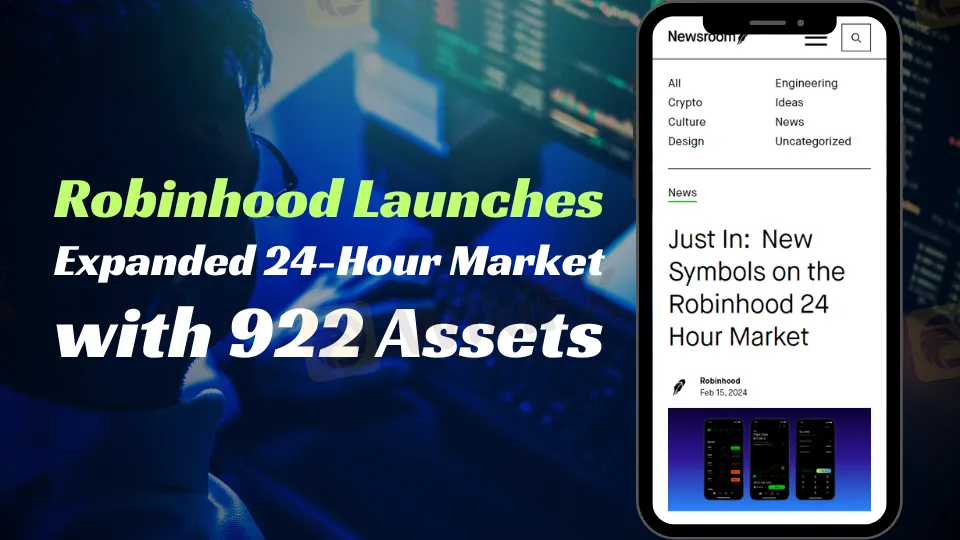简体中文
繁體中文
English
Pусский
日本語
ภาษาไทย
Tiếng Việt
Bahasa Indonesia
Español
हिन्दी
Filippiiniläinen
Français
Deutsch
Português
Türkçe
한국어
العربية
Robinhood Launches Expanded 24-Hour Market with 922 Assets
Abstract:Robinhood expands 24-hour trading to 922 assets, offering unprecedented market access anytime. This game-changing move democratizes trading, catering to various investor needs and schedules.

Robinhood, a famous trading website, has improved its offerings by introducing more assets to its 24-hour market. This development brings the total number of symbols accessible for overnight trading in the United States to an astonishing 922, making it a game changer for both traders and investors.
With the revised 24-hour market, traders may now place limit orders for full shares of some of the most traded ETFs and individual equities at any time of day or night, five days a week. This change implies that trading is no longer limited to regular market hours. Instead, it runs 24/7 from Sunday to Friday, offering traders unmatched market access.

For those who want to take advantage of this new option, here's a simple tutorial for accessing the Robinhood 24-Hour Market via the app:
- Select your asset: Stocks and ETFs having a 24-hour trading window will be featured in the app. There is also a complete 24-hour market list available, which displays the 922 stocks and ETFs that traders may trade. This list has various top symbols based on trading volume, appealing to a wide range of investment preferences.
- Name your price: Customers may use the 24-hour market orders in the Limit Order flow to designate the highest price they're prepared to pay for a security or the lowest price at which they'd sell. This feature gives merchants control over their transaction pricing.
- Set Trading Hours and Time in Force: Traders may choose a 24-hour market trading session and specify when their limit orders should be executed or expire. This flexibility enables more smart trade choices.
- Select the Number of Shares: After determining how many shares to purchase, traders will get a summary of the order, which includes the limit price, period in force, and total anticipated cost. A quick swipe is all it takes to complete the transaction.
Robinhood's entrance into the 24-hour market gives its consumers a huge edge. It enables them to act in real-time, efficiently manage their portfolios, and respond to new information as it becomes available, regardless of the time of day. This degree of access was previously unheard of on conventional trading platforms, and it marks a significant change in how people engage with the stock market.
This extended trading window benefits those who cannot trade during market hours owing to other responsibilities. It also lets traders respond swiftly to market-moving news and global events outside trading hours.
In conclusion, Robinhood's extension of its 24-Hour Market to 922 assets is a big step in democratizing stock market access. It helps traders manage their calendars and react rapidly to market changes, making it crucial for modern investors. This shows Robinhood's commitment to innovation and client service in the ever-changing financial trading market.
For the most recent currency and financial news, visit WikiFX Daily News. Stay informed and ahead—click here for today's top stories!

Disclaimer:
The views in this article only represent the author's personal views, and do not constitute investment advice on this platform. This platform does not guarantee the accuracy, completeness and timeliness of the information in the article, and will not be liable for any loss caused by the use of or reliance on the information in the article.
Read more

Authorities Alert: MAS Impersonation Scam Hits Singapore
MAS scam alert: Scammers impersonate officials, causing $614K losses in Singapore since March 2025. Learn how to spot and avoid this impersonation scam.

Billboard Warns of Crypto Scams Using Its Name – Stay Alert!
Billboard warns against fake crypto scams using its brand. Learn how to spot fraud and protect yourself from fake promotions.

Rising WhatsApp Scams Highlight Need for Stronger User Protections
UK consumers lose £2,437 on average to WhatsApp scams. Revolut demands stricter verification and AI monitoring to combat rising fraud on Meta platforms.

Interactive Brokers Launches Forecast Contracts in Canada for Market Predictions
Interactive Brokers introduces Forecast Contracts in Canada, enabling investors to trade on economic, political, and climate outcomes. Manage risk with ease.
WikiFX Broker
Latest News
TradingView Brings Live Market Charts to Telegram Users with New Mini App
Trump tariffs: How will India navigate a world on the brink of a trade war?
Interactive Brokers Launches Forecast Contracts in Canada for Market Predictions
Authorities Alert: MAS Impersonation Scam Hits Singapore
Stocks fall again as Trump tariff jitters continue
INFINOX Partners with Acelerador Racing for Porsche Cup Brazil 2025
Regulatory Failures Lead to $150,000 Fine for Thurston Springer
April Forex Trends: EUR/USD, GBP/USD, USD/JPY, AUD/USD, USD/CAD Insights
March Oil Production Declines: How Is the Market Reacting?
Georgia Man Charged in Danbury Kidnapping and Crypto Extortion Plot
Currency Calculator







